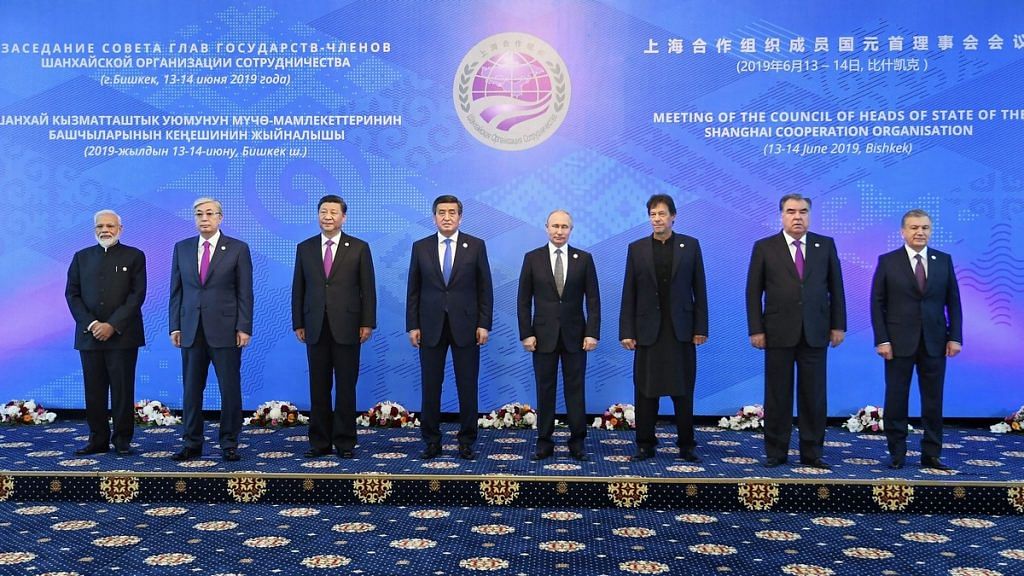Russian President Vladimir Putin is believed to have persuaded Pakistan Prime Minister Imran Khan to reciprocate Prime Minister Narendra Modi’s handshake in Bishkek last week on the sidelines of the Shanghai Cooperation Organisation (SCO) summit.
According to Pakistani sources, Khan was – predictably – quite upset that Modi didn’t fly over Pakistani airspace to reach Bishkek after asking the Pakistanis permission for the same, which was given. In fact, Khan also wrote three letters to Modi in the run-up to Bishkek, offering the hand of peace.
After all, how many times can a man say hello to you as you turn your face away?
Also read: PMs Modi, Imran Khan exchange pleasantries in Bishkek
Modi will definitely have to find a way to climb down from his Balakot angst. There is no easy way to deal with Pakistan’s policy of undermining India through cross-border terrorism.
This is why Modi will always have Bishkek. It is here, last week, that the veils finally fell from Modi’s eyes. India may be a rising power, which the world cannot ignore, but it was in Bishkek that Modi realised that in the quicksand of international politics, there are no rules. No permanent friends, enemies or acquaintances. Only plain and brutal national interest, sometimes enveloped in a bear hug, other times wreathed in smiles.
That’s why a video from Bishkek doing the rounds is important. It shows Russian President Vladimir Putin and Imran Khan in animated conversation at the SCO summit dinner, while Modi, sandwiched between Afghan President Ashraf Ghani and Kazakh President Kassym-Jomart Tokayev, looks straight ahead. (Chinese President Xi Jinping is sitting on Tokayev’s other side). At least in this video, and on this side of the table, there’s no conversation at all.
Did Modi wonder what Putin and Imran Khan were up to? Speculation has been rife for some time that Islamabad wants to buy Russian arms, although Moscow has told Delhi this is just to fight terror operations. Nevertheless, what was Putin, who has more than once clasped Modi warmly in his embrace, doing with India’s main enemy, Pakistan?
The importance of Bishkek is that Modi, who has been lucky so far because he has had to deal with an enervated Rahul Gandhi as his main opposition, must realise that international politics gives you no room to grandstand.
Also read: Modi’s Bishkek message to Imran Khan — forget talks until you end terrorism
If he has read his history, from Chanakya to the Treaty of Versailles, Modi must realise that nations, especially when they are down and out, must be allowed to save face.
Even when nations lose the World Cup, have to go with begging bowls to the IMF/ADB/World Bank and are constantly threatened with being put on the Financial Action Task Force (FATF) list, they must be allowed to survive.
Iran is a good example. On the FATF blacklist and once again in the crosshairs of the US sanctions, Iran keeps going, one step after another. Its latest weapon to deflect the oil sanctions is to call upon its old friends, the Russians, to invite Taliban leader Mullah Baradar to his first foreign visit outside Pakistan, to Moscow – incidentally, on 28 May, two days before Modi was sworn in again as prime minister.
Mullah Baradar spurned the US negotiator on the Afghan talks, Zalmay Khalilzad, and went to Moscow – no doubt, on the telling of the Pakistani generals. In one fell swoop, Russia had reinserted itself into a dialogue that the Americans have been trying, for years and years, to broker.
In Bishkek, Modi is believed to have walked up to Imran Khan – the foreign office establishments have different stories to tell their respective media, of course – upon which both shook hands and proceeded to have a brief chat in a room that appeared round the corner just at that very instant, whereupon they discussed a few things, including the hurly-burly of the Indian elections.
Also read: India can get a lot out of Bishkek — if PM Modi can remember lessons China taught Nehru
Clearly, the very carefully orchestrated messaging by both New Delhi and Islamabad is to ensure two things: In India, Modi must find a way to climb down so he can tell his own ‘karyakartas’ and favourable media why he is now talking to a country he called the enemy during the recent elections.
In Pakistan, too, a carefully affronted establishment must also tell its own favourable media why and how the dialogue with India can, will and must soon begin.
This is how the story goes in Islamabad: Putin persuaded Imran Khan to reciprocate Modi’s handshake. Khan, who is wooing Putin these days, said yes.
Putin, whose Russia has fallen from great power status to a middle-income country, knows what it means to never say no. In Dushanbe, one day after Bishkek, Putin gifted Xi Jinping a box of Russian ice-cream for his 66th birthday, while Xi told Russian news agency Tass that Putin is his “best and bosom friend.”
Also read: From principles to pragmatism: Five ways Modi has changed India’s foreign policy
Certainly, Modi wouldn’t like Putin being chummy with either Imran Khan or Xi Jinping – both Pakistan and China are India’s enemies, remember?
That’s why Modi will – or must – always remember Bishkek. It was here, in this small Central Asian town, that illusion gave way to pragmatism. It is here that the veils fell. As he smiled sweetly at Imran Khan – who was seen cosying up to Putin, Modi’s best friend – Modi probably realised that the world is a really tough place.
Perhaps the PM has gotten used to dealing with a weak opposition that can’t even put together a leader in the Lok Sabha. But Putin, Xi, Imran Khan and his generals or Donald Trump – who Modi meets later this month in Osaka – are cut from a different cloth. Clearly, Modi has his foreign policy work cut out.
